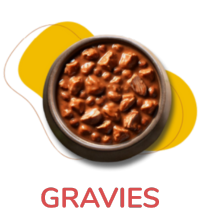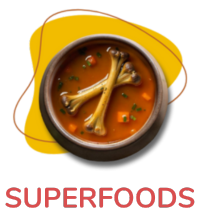We, as pet parents, would never compromise our dog's health and well-being. The responsibility is upon us to ensure that our four-legged friends are fed a diet which is both balanced and nutritious. Children and our furry friends should be fed appropriately at different stages of life for their own well-being.
Here, we will discuss what to feed a puppy and how to address the specific needs of puppies, adults and senior dogs regarding food as well as how their dietary needs change with time.
Puppy-specific Nutritional Needs:
Young puppies are full of energy, naturally inquisitive by nature, and growing at a rapid pace. At this critical time, while they are still maturing, it is extremely important for their development to nourish them well, with a diet high in essential nutrients that help support their growth and strengthen their immune system. So, to wrap this all up, here are a couple of things you guys really need to understand about feeding puppies:
High-quality protein: Protein is essential for muscle and tissue growth. Great sources of protein include whole proteins such as chicken, beef or fish that are found in a variety of puppy food formulations.
Balanced Diet: Puppies need a highly balanced diet with proper proportions of protein, fats, carbohydrates, vitamins and minerals. Make sure you select the food made to suit their special dietary requirements.
Caloric Density: Since puppies grow rapidly and have very high energy requirements, they need a diet with higher caloric density. Use puppy food with a higher calorie density to make your puppy energetic without overfeeding.
Calcium and Phosphorus: Both calcium and phosphorus are necessary for the growth of a puppy's bones. Balanced calcium and phosphorus help in healthy growth and prevent skeletal issues.
Regular Feeding: Pups have tiny bellies and fast metabolisms, so feeding a few smaller, frequent meals daily could help.



Adult Dog Diet Considerations:
Dogs, like humans, require a diet change as they get older. It is important to ensure that adult dogs receive a diet fulfilling all their nutritional needs. Tips on feeding Adult dogs are as follows:
Manage your pet's weight: Dogs are prone to obesity problems, leading to several health issues. Choose a dog food formula that promotes weight management and modifies the serving size according to your dog's activity level and metabolism
Lean Protein: Adult dogs, just like puppies, still need high-quality protein for muscle maintenance. Opt for dog food with lean protein sources to support their health without contributing to weight gain.
Omega-3 and Omega-6 Fatty Acids: The benefits of omega-3 and omega-6 fatty acids include healthy skin and a shiny coat. The common sources of omega-3 and omega-6 fatty acids found in adult dog foods include flaxseed and fish oil.
Joint Health: Glucosamine and Chondroitin sulphate are great for pet breeds specially suffering from arthritis or other bone/joint problems due to old age.
Regular Exercise: Exercise is essential for adult dogs. Include daily walks, playtime, and mentally stimulating activities to keep them healthy and engaged.


Senior Dog Dietary Adjustments:
As dogs grow older, they become less active and their diet needs to be adjusted according to developing health ailments, diminished appetite and decreasing energy due to aging process. We have some quick and easy diet suggestions for senior dogs:
Decreased Calorie Consumption: Senior dogs need fewer calories to maintain a healthy weight. To avoid weight gain, select a low calorie senior dog food formula.
Easily Digestible Ingredients: Dog food with easily digestible ingredients and smaller kibble sizes work well for the older dog that may have digestive or dental issues.
Joint Support: One of the many common issues amongst aging dogs is arthritis or the joint stiffness. Opt for dog food with extra glucosamine, chondroitin sulfate, and omega-3 fatty acids to promote joint health and decrease inflammation.
Antioxidants and Nutritional Supplements: Senior dogs can experience a health boost from antioxidants and nutritional supplements to boost their immune system and general health. Your vet can help you decide if your senior dog would benefit from probiotics, beta-carotene, vitamins C and E, or other supplements or not.
Frequent visits to the vet: Dogs are highly vulnerable to age-related illnesses like cancer, diabetes, and kidney disease as they grow older. Schedule a visit with your veterinarian for your senior dog's routine examinations so you can keep a close eye on their health and take care of any issues as soon as they appear.



Conclusion
In summary, nutrition is obviously critical to keeping our fur babies in optimal health and overall well-being. Knowing the specific nutritional requirements for puppies, adult dogs, and seniors ensures we can derive the appropriate support they need to develop healthy, thriving, energised, longer lives. Always consult your veterinarian when choosing high-quality dog food based on your pet’s life stage or if you have any questions about your pet's overall health or diet. With the right nutrition and care, your dog can live a happy and healthy life at any age.







